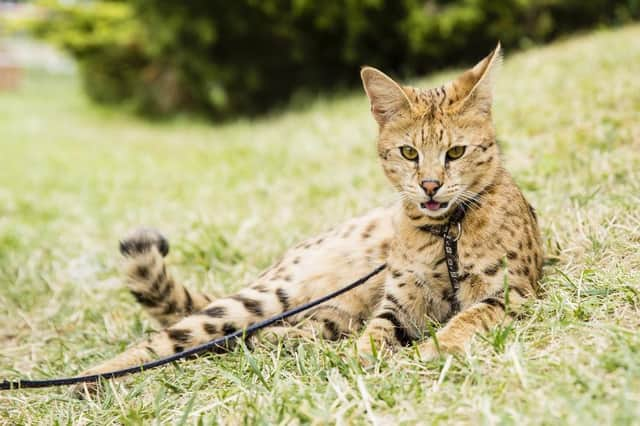What is a Savannah cat? If you can get the Serval hybrid in the UK - and laws around owning big cats explained


A large cat with leopard-like spots caused alarm when it was spotted in a back garden in London yesterday (26 May), according to the BBC.
Firearms officers and an animal expert were called to the scene, and a resident’s garden was sealed off.
Advertisement
Hide AdAdvertisement
Hide AdThe expert concluded the cat was a hybrid - a cross between a domestic cat and a Savannah breed.
But what is a Savannah cat, are they legal - and what are the rules around owning big cats in the UK?
What is a Savannah cat?
Tall, lean and graceful with a spotted pattern, a Savannah cat is a cross between a domestic cat and a Serval, a wild African cat.
They are around 33 - 38cm in length, and can weigh 7–15 pounds (3.2–6.8 kg), making them the largest domestic breed.
However, their size depends on which generation they are and first generation male cats tend to be the largest.
Active, curious and sociable, Savannah cats require lots of interaction with their humans and might not be suitable for everyone - especially families with small children.
They tend to live for around 15 - 20 years, and a kitten can cost between £800 and £16,000 depending on the breed.
Are Savannah cats legal in the UK?
In the UK, it is legal to own Savannah cats in most cases, but it depends on the generation of the cat.
Advertisement
Hide AdAdvertisement
Hide AdEach generation, ranging from F1 to F4, has a different percentage of African Serval in its genetics.
An F1 generation cat is the first cross between the wild African Serval and the domestic cat, and these are illegal to own in the UK without a Dangerous Wild Animal Licence, which most cat owners in the UK won’t be able to get.
However, cats that are further down the generations - from F2 to F4 - are legal to own in the UK.
What other exotic big cats are legal in the UK?
According to The Dangerous Wild Animals Act 1976, you are allowed to own wild animals in the UK, but you must obtain a licence for each animal you own, which is difficult to do for a regular cat owner.
You need a licence to own any of the following cats:
Bobcat Caracal Cheetah Jaguar Leopard Lion Lynx Ocelot Puma Serval Tiger
You can own any of these cats without a licence, as well as hybrid cats descended exclusively from any one or more of these species:
Wild cat Pallas cat Little spotted cat Geoffroy’s cat Kodkod Bay cat Sand cat Black-footed cat Rusty-spotted cat Domestic cat
Why are there big cat sightings in the UK?
There have been a number of reported big cat sightings around the UK.
Advertisement
Hide AdAdvertisement
Hide AdSightings around the British countryside are often reported as panthers, pumas or black cats.
Experts believe that it’s highly unlikely that there is a population of true big cats in the UK, especially a breeding population.
However, some individual animals have been found, such as the Eurasian lynx, and a puma which was captured alive in Scotland in 1980.
It’s believed that these were escaped or released pets that had been held illegally in the UK, and possibly released after the animals became too difficult to manage.
Some photos taken from a distance have also been discovered to be domestic cats, which appear to be larger than they actually are from far away.